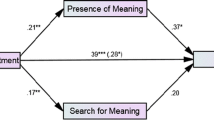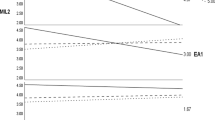Abstract
A proliferation of empirical studies over the past few decades has examined the connection between religiosity and health; an extension of this literature has focused on the association between three styles of religious problem-solving—collaborative, self-directing and deferring—and psychological adjustment. Few studies, however, have examined variables that may mediate this association. The present study utilized a cross-sectional design to examine the pathways (means to attain goals) and agency (goal-directed energy and determination) components of hope as mediators in the association between religious problem-solving styles and psychosocial adjustment. Students (n = 91) at a midsize Southeastern university completed a demographic questionnaire, the Religious Problem-solving Styles Scale, Adult Hope Scale, and the Life Satisfaction Scale. Mediation analyses revealed that both the collaborative and deferring religious problem-solving styles were positively associated with life satisfaction through agency thinking, but the self-directing religious problem-solving style was negatively associated with life satisfaction through agency thinking. Contrary to expectations, there was no significant indirect effect of any of the religious problem-solving styles on life satisfaction via pathways thinking. These results suggest that approaching problems within a specific religious framework is associated with psychosocial adjustment, and that each religious problem-solving style may exert its effects by either amplifying or quelling goal-directed motivation and willpower. Future studies should utilize quasi-experimental designs in order to delineate cause-and-effect relationships among religious problem-solving styles, agency and pathways thinking, and psychosocial adjustment.




Similar content being viewed by others
References
Ano, G. G., & Vasconcelles, E. B. (2005). Religious coping and psychological adjustment to stress: A meta-analysis. Journal of Clinical Psychology, 61, 461–480.
Ashby, J. S., Dickinson, W. L., Gnilka, P. B., & Noble, C. L. (2011). Hope as a mediator and moderator of multidimensional perfectionism and depression in middle school students. Journal of Counseling & Development, 89, 131–139.
Berendes, D., Keefe, F. J., Somers, T. J., Kothadia, S. M., Porter, L. S., & Cheavens, J. S. (2010). Hope in the context of lung cancer: Relationships of hope to symptoms and psychological distress. Journal of Pain and Symptom Management, 40, 174–182.
Chang, E. C., Kahle, E. R., Yu, E. A., Lee, J. Y., Kupfermann, Y., & Hirsch, J. K. (2013). Relations of religiosity and spirituality with depressive symptoms in primary care adults: Evidence for hope agency and pathway as mediators. The Journal of Positive Psychology, 8, 314–321.
Cheavens, J. S., Feldman, D. B., Gum, A., Michael, S. T., & Snyder, C. R. (2006). Hope therapy in a community sample: A pilot investigation. Social Indicators Research, 77, 61–78.
Diener, E., Emmons, R. A., Larsen, R. J., & Griffin, S. (1985). The Satisfaction with Life Scale. Journal of Personality Assessment, 49, 71–75.
Feldman, D. B., Davidson, O. B., Ben-Naim, S., Maza, E., & Margalit, M. (2016). Hope as a mediator of loneliness and academic self-efficacy among students with and without learning disabilities during transition to college. Learning Disabilities Research & Practice, 31, 63–74.
Hayes, A. F. (2013). Introduction to mediation, moderation, and conditional process analysis: A regression-based approach. New York: Guilford Press.
Hill, P. C., & Pargament, K. I. (2003). Advances in the conceptualization and measurement of religion and spirituality: Implications for physical and mental health research. American Psychologist, 58, 64–74.
Irving, L. M., Snyder, C. R., Cheavens, J., Gravel, L., Hanke, J., Hilberg, P., & Nelson, N. (2004). The relationships between hope and outcomes at the pretreatment, beginning, and later phases of psychotherapy. Journal of Psychotherapy Integration, 14, 419–443.
Koenig, H. G. (2001). Religion and medicine II: Religion, mental health, and related behaviors. The International Journal of Psychiatry in Medicine, 31, 97–109.
Kuyel, N., Cesur, S., & Ellison, C. G. (2012). Religious orientation and mental health: A study with Turkish university students. Psychological Reports, 110, 535–546.
Lawrence, R. T. (1997). Measuring the Image of God: The God Image Inventory and the God Image Scales. Journal of Psychology and Theology, 25, 214–226.
Levin, J. (2010). Religion and mental health: Theory and research. International Journal of Applied Psychoanalytic Studies, 7, 102–115.
Maltby, J., & Day, L. (2000). Depressive symptoms and religious orientation: examining the relationship between religiosity and depression within the context of other correlates of depression. Personality and Individual Differences, 28, 383–393.
Pargament, K. I., Ensing, D. S., Falgout, K., Olsen, H., Reilly, B., Van Haitsma, K., et al. (1990). God help me: (I): Religious coping efforts as predictors of the outcomes to significant life events. American Journal of Community Psychology, 18, 793–824.
Pargament, K. I., Kennell, J., Hathaway, W., Grevengoed, N., Newman, J., & Jones, W. (1988). Religion and the problem-solving process: Three styles of coping. Journal for the Scientific Study of Religion, 27, 90–104.
Pavot, W., & Diener, E. (2008). The Satisfaction with Life Scale and the emerging construct of life satisfaction. Journal of Positive Psychology, 3, 137–152.
Peleg, G., Barak, O., Harel, Y., Rochberg, J., & Hoofien, D. (2009). Hope, dispositional optimism and severity of depression following traumatic brain injury. Brain Injury, 23, 800–808.
Pew Research Center, Nov. 3, 2015, “U.S. Public Becoming Less Religious”
Pew Research Center, April 25, 2018, “When Americans Say They Believe in God, What Do They Mean?”
Phillips, R. E., Lynn, Q. K., Crossley, C. D., & Pargament, K. I. (2004). Self-directed religious coping: A deistic God, abandoning God, or no God at all? Journal for the Scientific Study of Religion, 43, 409–418.
Preacher, K. J., & Hayes, A. F. (2008). Asymptomatic and resampling strategies for assessing and comparing indirect effects in multiple mediator models. Behavior Research Methods, 40, 879–891.
Rizzuto, A. M. (1979). The birth of the living God: A psychoanalytic study. Chicago: University of Chicago Press.
Rose, A. H., Rose, J. R., Miller, R. B., & Dyer, W. J. (2018). Exploring hope as a mediator between religiosity and depression in adolescents. Journal of Religion & Spiritualty in Social Work: Social Thought, 37, 239–253.
RustØen, T., Cooper, B. A., & Miaskowski, C. (2010). The importance of hope as a mediator of psychological distress and life satisfaction in a community sample of cancer patients. Cancer Nursing, 33, 258–267.
Sherwin, E. D., Elliott, T. R., Rybarczyk, B. D., Frank, R. G., Hanson, S., & Hoffman, J. (1992). Negotiating the reality of caregiving: Hope, burnout and nursing. Journal of Social and Clinical Psychology, 11, 129–139.
Snyder, C. R., Harris, C., Anderson, J. R., Holleran, S. A., Irving, L. M., Sigmon, S. T., et al. (1991). The will and the ways: development and validation of an individual-differences measure of hope. Journal of Personality and Social Psychology, 60, 570–585.
Steffen, P. R., & Masters, K. S. (2005). Does compassion mediate the intrinsic religion-health relationship? Annals of Behavioral Medicine, 30, 217–224.
Yangarber-Hicks, N. (2004). Religious coping styles and recovery from serious mental illnesses. Journal of Psychology and Theology, 32, 305–317.
Author information
Authors and Affiliations
Corresponding author
Ethics declarations
Conflict of interest
The authors declare that there is no conflict of interest.
Ethical Approval
All procedures performed in studies involving human participants were in accordance with the ethical standards of the institutional and/or national research committee and with the 1964 Helsinki declaration and its later amendments or comparable ethical standards.
Human and Animal Rights
This article does not contain any studies with animals performed by any of the authors.
Informed Consent
Informed consent was obtained from all individual participants included in the study.
Additional information
Publisher's Note
Springer Nature remains neutral with regard to jurisdictional claims in published maps and institutional affiliations.
Rights and permissions
About this article
Cite this article
Parenteau, S.C., Wu, H. Religious Problem-Solving Styles and Life Satisfaction: Exploring God, the Will and the Way. J Relig Health 60, 4451–4466 (2021). https://doi.org/10.1007/s10943-020-01159-5
Accepted:
Published:
Issue Date:
DOI: https://doi.org/10.1007/s10943-020-01159-5




